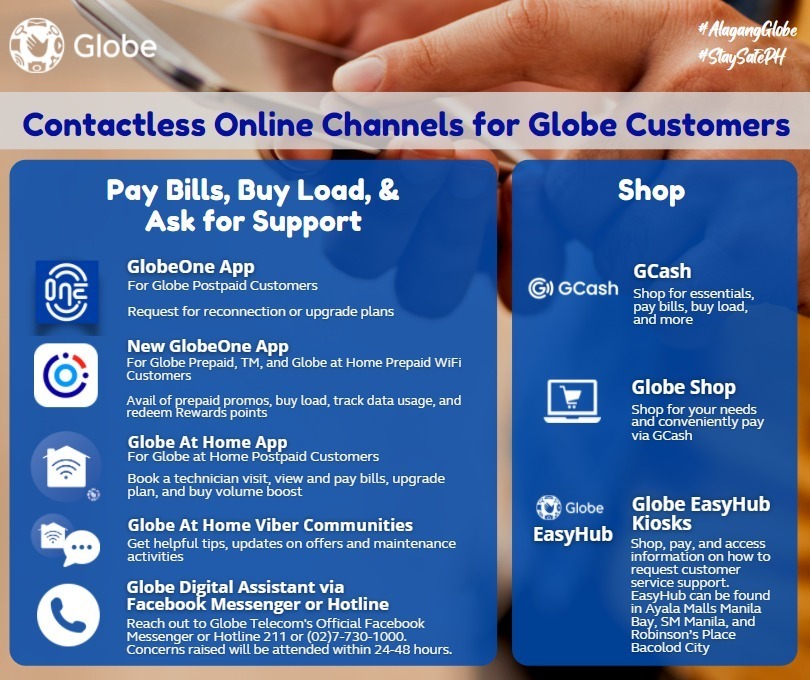NEWS
Globe encourages use of digital channels with looming service response slowdown as Covid cases surge in NCR

January 11, 2022 7:13 p.m.
As Covid infections keep rising every day, Globe is not spared from the challenges as many of its employees and vendor partners are either getting sick or have to go on leave to take care of sick loved ones.
“Even as we strive to maintain our service level standards, the reality is that our employees and partners are also human beings. They go through the same challenges as members of the community with rising infections. We sincerely ask for the understanding of our customers,” said Beck Eclipse, Globe Chief Customer Experience Officer.
Globe continues to enhance its contactless digital channels to ensure that essential services are up and available amid the surge in Covid cases. Upgrades are done regularly to introduce new features and ensure readiness to support customers.
“We are encouraging our customers to utilize our digital channels in the safety of their homes. We continue to innovate on all our channels so we can serve them at this time when they need us most,” added Eclipse.
As part of this effort, Globe is transitioning its old GlobeOne app to the new GlobeOne app to improve customers’ experience and enable them to get the support they need in just a few taps. With the old app, postpaid customers can submit service requests like reconnection and change plan, even as we are preparing to transition it to the new version. In the meantime, prepaid customers can use the new GlobeOne app to buy load or promos, track their data usage, and redeem Globe Rewards. More transactions will be available in the new GlobeOne app in the coming months. The new GlobeOne app may be downloaded via App Store or Google Play: https://glbe.co/NewGlobeONE.
Meanwhile, broadband customers may continue to use the Globe At Home app to book a technician visit, view and pay their bills, upgrade their plan, and buy volume boost. Globe assures customers that technicians are ready to help with broadband connection concerns within 24-48 hours upon request.
Globe At Home customers are also welcome to our Viber communities where they can get helpful tips, updates on offers and maintenance activities, and more. At present, there are eight viber communities catering to customers from Alabang villages, Ayala Westgrove, Cavite, Cebu, Naga, Legazpi, Davao, and Valenzuela. Learn more by visiting https://www.globe.com.ph/help/broadband/viber-communities.html.
Alternatively, customers may report concerns through Globe’s Digital Assistant at 211 or (02)7-730-1000, or on Facebook Messenger. Concerns raised through these channels will be attended to within 24-48 hours.
Select Globe Stores will be open to handle important transactions like plan application, upgrade, renewal, and reactivation; device pick-up, change ownership, change SIM, device return and replacement, bills payments, GCash cash-ins, and prepaid products. For an updated list of our Stores, visit https://www.globe.com.ph/stay-safe-at-home/stores.html.
In addition, Globe EasyHub all-in-one digital kiosks are open to allow customers to shop, pay, explore, and even access information on how to request customer service support in Globe’s mobile platforms. EasyHub can be found in Ayala Malls Manila Bay, SM Manila, and Robinson’s Place Bacolod City.
Globe’s online shop is also available at https://shop.globe.com.ph for our customers’ needs. They can pay conveniently using GCash, the largest e-wallet service provider in the country. GCash can also be used to shop for essentials, pay utility bills, buy prepaid load, and more.
Globe strongly supports the United Nations Sustainable Development Goals, particularly UN SDG No. 9, highlighting the roles of infrastructure and innovation as crucial drivers of economic growth and development. It is committed to upholding the UN Global Compact principles and contributing to 10 UN SDGs.
For more info, customers may visit www.globe.co/alagang-globe.
NEWS
TikTok enhances safety, transparency for Filipino community with new initiatives

7:01 p.m. July 16, 2023
TikTok, the world’s leading short-form video platform, is taking further steps to ensure a safer and more transparent platform for its Filipino community. In response to the evolving digital landscape and the rise of AI-generated content (AIGC), these initiatives are designed to maintain a secure environment, uphold community guidelines, and ensure users can trust the content they encounter on the platform.
Strengthening Community Guidelines Enforcement
As part of its ongoing efforts to safeguard its community, TikTok recently published its Q1 2024 Community Guidelines Enforcement Report. During this period from January 1 to March 31, 2024, TikTok removed 4.26 million videos in the Philippines for violations of its Community Guidelines. Of these, 99.7% were removed proactively, and 95% were taken down within 24 hours.
To further enhance transparency, TikTok updated its Community Guidelines in April to provide clearer rules and introduce new features that help creators understand and comply with policies. Available in English and Filipino, these guidelines include detailed definitions and outline moderation practices for features like Search, LIVE, and the For You feed, ensuring policies are clear and accessible to all users.
Advancing AI-Generated Content Transparency
In response to the increasing prevalence of AI-generated content, TikTok has implemented new measures for transparency. Since May, TikTok has automatically labeled AI-generated content uploaded from specific platforms. This initiative is part of a collaboration with MediaWise, a program of the Poynter Institute, and the Coalition for Content Provenance and Authenticity (C2PA), making TikTok the first video-sharing platform to adopt C2PA’s Content Credentials technology. These labels aim to provide users with clear context about the nature of the content they consume.
Educating the Community with Media Literacy Tools
To support its community in navigating AI-generated content and combating misinformation, TikTok is launching new media literacy resources. Developed in collaboration with experts, these resources are integral to TikTok’s broader strategy to enhance user understanding and foster a more informed community. As part of this initiative, TikTok has partnered with MediaWise to release 12 educational videos throughout the year. These videos aim to teach universal media literacy skills and explain how TikTok’s AI-generated content labels can help contextualize content. This partnership underscores TikTok’s commitment to educating its community and fostering a more informed user base.
Expanding AIGC Labeling Through Partnerships
Building on its efforts to ensure content transparency, TikTok has extended its auto-labeling capabilities for AI-generated content created on other platforms. By integrating the ability to read Content Credentials from C2PA, TikTok automatically recognizes and labels AI-generated content, with plans to expand this to audio-only content soon.
In the coming months, TikTok plans to attach Content Credentials to its content, ensuring transparency even when content is downloaded, allowing users to utilize C2PA’s Verify tool to identify AI-generated content and understand its creation details.
Driving Industry-Wide Adoption
In its mission to promote industry-wide adoption of Content Credentials, TikTok has joined the Adobe-led Content Authenticity Initiative (CAI). As the first video-sharing platform to implement Content Credentials, TikTok is at the forefront of encouraging transparent content practices across the industry. The gradual increase in auto-labeled AI-generated content on TikTok is expected to grow as more platforms adopt this technology, fostering a more transparent digital landscape.
For You Feed and Creator Code of Conduct
To further enhance safety, TikTok has introduced new standards that will temporarily restrict accounts that repeatedly violate content standards. These accounts and their content will be harder to find in search, with creators being notified and given the option to appeal.
Additionally, TikTok published a Creator Code of Conduct outlining the standards expected from creators involved in TikTok programs, features, events, and campaigns. This code reinforces TikTok’s commitment to maintaining a safe and inclusive platform.
Through these measures, TikTok continues to focus on helping its community, especially creators, understand its rules and enforcement methods to ensure a safer experience for its users. By embracing continuous innovation and collaboration, TikTok strives to create a secure and inclusive space for creativity and connection.
NEWS
SM Prime, DTI empower MSMEs with 83 SM mall spaces, training, mentorship


9:15 p.m. July 12, 2024
Good news for Micro-, Small, and Medium-Sized Enterprises (MSMEs)! SM Prime Holdings (SM Prime) and the Department of Trade and Industry (DTI) solidified a partnership through a Memorandum of Agreement (MOA) signing ceremony held on July 1 at the SM Prime Headquarters.
This collaboration empowers MSMEs with prime mall space in 83 SM Malls nationwide, aligning with the One Town, One Product (OTOP) Philippines program. Besides providing space, SM Prime offers MSMEs discounted booth rentals, training programs on product development, marketing, financial management, and mentorship opportunities with experienced business leaders.



NEWS
DTI National Food Fair celebrates local flavors at SM Megamall

8:26 p.m. July 11, 2024
The Department of Trade and Industry (DTI) successfully concluded the 10th National Food Fair at SM Megamall’s Megatrade Halls 1-3, held from July 3-7, 2024. This premier event showcased the rich flavors of the Philippines and empowered over 200 Micro-, Small, and Medium-Sized Enterprises (MSMEs).
Food enthusiasts enjoyed a bounty of fresh produce, regional specialties, and delectable treats from all corners of the country. Attendees had the opportunity to stock up on pantry staples, explore health-conscious options, and discover unique ingredients to elevate their cooking skills.
(L-R): Megatrade Hall’s Maite Quiogue, SM Supermalls’ Assistant Vice President for Operations Royston Cabunag, Department of Trade and Industry (DTI) Undersecretary for Micro-, Small, and Medium-Sized Enterprises (MSME) Development Group Cristina Roque, Guest of Honor Winnie Chua-Go, SM Megamall Assistant Vice President for Operations Christian Mathay, SM Supermalls’ Vice President for Corporate Marketing Grace Magno, DTI-Bureau of Market Development, Promotions, and One Town, One Product (OTOP) Philippines Director Marievic Bonoan, and SM Megamall Assistant Mall Manager Isabella Manjon
(L-R): Department of Trade and Industry (DTI) Undersecretary for Micro-, Small, and Medium-Sized Enterprises (MSME) Development Group Cristina Roque, Guest of Honor Winnie Chua-Go, and DTI-Bureau of Market Development, Promotions, and One Town, One Product (OTOP) Philippines Director Marievic Bonoan
The 2024 Department of Trade and Industry (DTI) Bagong Pilipinas National Food Fair brings together the best food and flavors from all 16 regions.
Fresh pomelos and other local fruits take center stage at the National Food Fair in Megatrade Hall.
A potential buyer gets ready to take home bottled Bicol Express and Laing at the 10th National Food Fair in SM Megamall.
Crispy, salty, and packed with nutrients —these water spinach chips are the perfect healthy snack.
Bottled honey and baked fruit crisps, all made with local ingredients.
Davao del Sur and Misamis Oriental’s chocolate products are crafted from premium cacao beans.
Quality golden salted eggs from Rizal.
A variety of coconut products from San Pablo, Laguna.

















